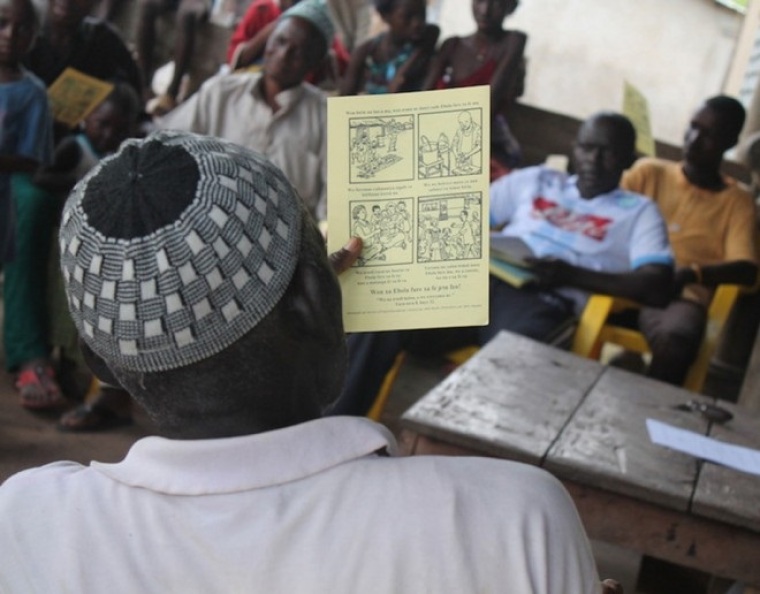Uncertainty a challenge in Christians' response to Africa's Ebola epidemic

WEST AFRICA (Christian Examiner) -- U.S-based Christian charities initially responded to the Ebola epidemic in Guinea, Liberia, Sierra Leone and surrounding nations to provide cleaning supplies and Ebola-prevention resources for local Christians to use as they ministered in their communities.
It was a ministry response that for the most part started in August and largely has continued since.
But even as ministries keep pushing at what they already are doing, they ponder what is next.
"You can't look at the needs and not be moved," said Jeff Palmer, executive director of Baptist Global Response, headquartered in Nashville, Tenn. "The desire to make Christ known in word and in deed motivates us.
"I don't think we have seen the end of this," he told the Christian Examiner. "I would hope people would be praying for those responding and those in need, and when Ebola is over, there still will be bad things over there."
Ebola is "over" for the 4,000 youngsters in the three countries considered the hot zone for the virus. These children in Guinea, Liberia and Sierra Leone have lost one or both parents and don't have the disease themselves, according to the United Nations Children's Fund (UNICEF).
The information portrays a grim existence for survivors, with more than 1,000 women (and a large number of men) left with dead spouses and without any possessions after all their belongings were burned to eradicate the disease. Destitute, with no means to generate income, they also suffer the indignity of being shunned by neighbors fearful of catching the disease.
World Vision International, headquartered in Washington on the west coast, is among the long-term stakeholders in Sierra Leone, their point of ministry in West Africa since 1996.
"We're building on the resources we have in place," said Kristen Barredo, program management officer for World Vision's humanitarian and emergency affairs. "We're looking at a situation very similar to HIV/AIDS. There's a stigma that comes with having a parent or another family member who has had Ebola."
We're responding with a "sponsorship" kind of method to meet human needs, Barredo told the Christian Examiner, providing quarantined families with food assistance.
On-site staffers and volunteers also provide mental support, counseling, physical care, social networks and family reunification, among other resources.
Schools in Sierra Leone have closed because of Ebola, and World Vision is working with the Minister of Education to provide equipment and to pay for recording class sessions so students can listen to radio broadcasts of them. There is a 90 minute segment each morning for elementary students; and one in the afternoon for secondary school lessons.
Save the Children, headquartered in Fairfield, Conn., has been working with the Liberian government to set up interim care centers to monitor children orphaned by the disease and going through a required 21-day quarantine period.
"The community is afraid of them," said Greg Ramm, country director for Save the Children in Liberia.
Being shunned by people in their community adds another layer of grief to people needing comfort for the loss of their loved one.
Lifesong for Orphans maintains orphanages in several developing nations -- all in West Africa, and full. This faith-based charity, headquartered in Gridley, Ill., is working with local pastors and aid organizations to find places for children whose families have rejected them.
Kay Knapp, a U.S. liaison for Lifesong in Liberia, detailed their response in a Fox news report.
"More than 500 families have been helped in the last few months," she said. "If we receive more donations, we will continue to provide staple food items like rice, oil, flour and sugar, to affected families – some of whom are headed by children."
Money is one answer.
The needs are many and include prevention kits and educational materials, medical supplies, food, water, and replacement items for possessions taken from homes of Ebola families and burned, leaving survivors with essentially nothing.
Long-established Christian entities say financial donations are better than goods. It lets them purchase as much as possible locally, typically at lower costs and the infusion of cash help the economies they're working in. They also want to control inventories of hazmat suits, gloves, goggles, etc. especially because of the need to standardize what is in stock.
"Your life literally depends on knowing the exact right way to put the gear on, and the exact right way to take it off, and we can't train for a variety of different equipment," said Rebecca Milner, chief fund-raiser for International Medical Corps, headquartered in Los Angeles.
While countries outside the region ponder what steps to take to prevent the Ebola virus from penetrating their borders, ministries in the Ebola zone of West Africa await those decisions so they can adapt to provide manpower, supplies and facilities to meet the needs for fighting Ebola and ministering to people.